In this edition of Court Judgements, we look at the Supreme Court’s judgements on Child sexual exploitative and abuse material and the POCSO Act, and failure to furnish details on Preventive Detention, and assumption of office by elected candidates, Kerala High Court’s judgement of Right to Unadulterated food, and Allahabad High Court’s judgement on desertion in marriage.
Supreme Court: Viewing, distribution or displaying of any child pornographic material without actual or physical possession would amount to offence under POCSO Act
In Just Rights for Children Alliance vs. S. Harish, the Supreme Court held that any act of viewing, distribution or displaying of any child pornographic material by a person over the internet without any actual or physical possession or storage of such material in any device or in any form or manner would also amount to ‘possession’ in terms of Section 15 of the POCSO, provided the said person exercised an invariable degree of control over such material, by virtue of the doctrine of constructive possession.
The brief facts of the case are as follows: an FIR was lodged against the respondent for offences under Section 67B of the IT Act, 2000 and Section 14(1) of the POCSO Act, accusing him of being an active consumer of pornography and allegedly downloading child pornography onto his mobile phone. After the investigation concluded, a chargesheet was filed, charging the respondent under Section 67B of the IT Act and Section 15(1) of the POCSO Act.
Aggrieved by this, the respondent approached the High Court of Judicature at Madras, seeking to quash the criminal proceedings. The High Court quashed the proceedings on three primary grounds:
- The Court observed that an offence under Section 14(1) of the POCSO Act requires the involvement of a child for pornographic purposes by the accused. Since no child was involved in this case, the section was not applicable.
- Regarding Section 67B of the IT Act, the High Court found that this provision applies only if the accused has published, transmitted, or created content involving children in sexually explicit acts. Although the respondent admitted to watching pornography, mere viewing or downloading of child pornography, without transmitting or publishing it, did not constitute an offence under Section 67B.
- Finally, the High Court noted that there was no evidence to suggest that the respondent had transmitted or published the material, and therefore, no offence was made out under the POCSO Act, IT Act, or the Indian Penal Code
The present appeal is against this order. The Counsel for the appellants argued that interpreting the relevant provisions of the POCSO act that mere storage or possession does not constitute an offence would lead to a proliferation of child sexual exploitative and abuse material (CSEAM). The Counsel for the respondent argued that the date of receipt of videos recovered from the mobile phone was in 2019, at which point the 2019 amendment to Section 15 was not yet in force. Further, it is argued that even if it is assumed that the respondent had watched the said videos once and then failed to delete it, he cannot be charged under Section 15(1) of the POCSO, as he was unaware of its presence due to the government’s failure to publicize the law. Considering all submissions, the court framed the following issues that are to be determined:
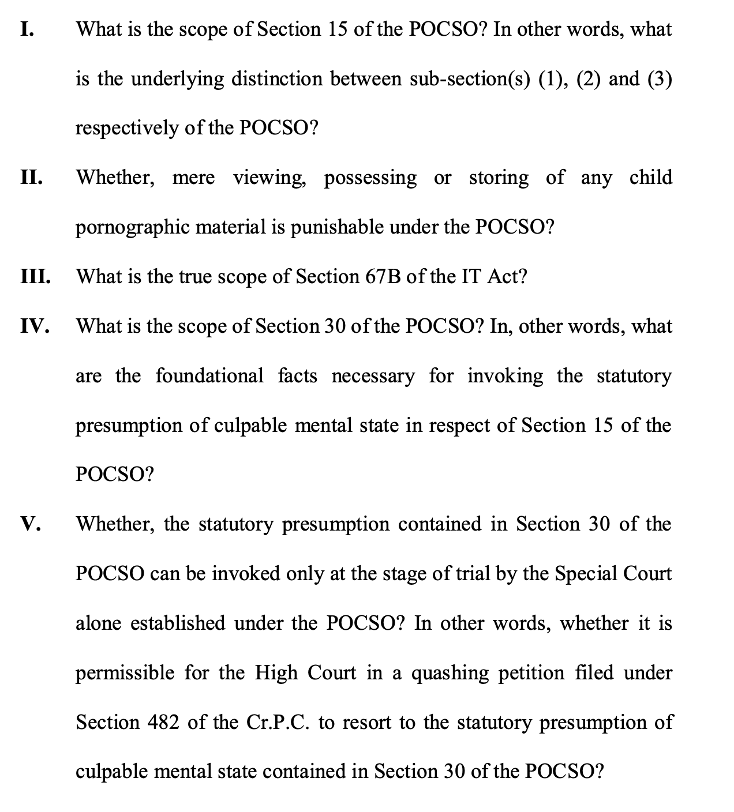
The apex court has ruled that, for offences under the POCSO Act relating to child pornographic material, such as Section 15, courts need only establish a prima facie subjective satisfaction that the material appears to depict a child, as assessed by a reasonable person.
For Section 15(1), the prosecution must first prove essential foundational facts to validly invoke the statutory presumption of culpable mental state. This involves demonstrating the storage or possession of child pornographic material and that the accused did not delete, destroy, or report it.
Section 15(2), however, requires additional evidence beyond mere storage or possession; it necessitates proof of actual transmission, propagation, display, or distribution of the material, or that the accused facilitated any of these acts.
Finally, under Section 15(3) of the POCSO Act, the prosecution must show that the accused stored or possessed child pornographic material with the intent to derive a benefit. In this situation, the burden of proof shifts to the accused to demonstrate that their storage or possession was not for any commercial purpose.Top of Form
On Section 67B of the IT Act, the apex court held that it ought to be interpreted in a purposive manner that suppresses the mischief, and advances the remedy and ensures that the legislative intent of penalizing the various forms of cyber-offences relating to children.
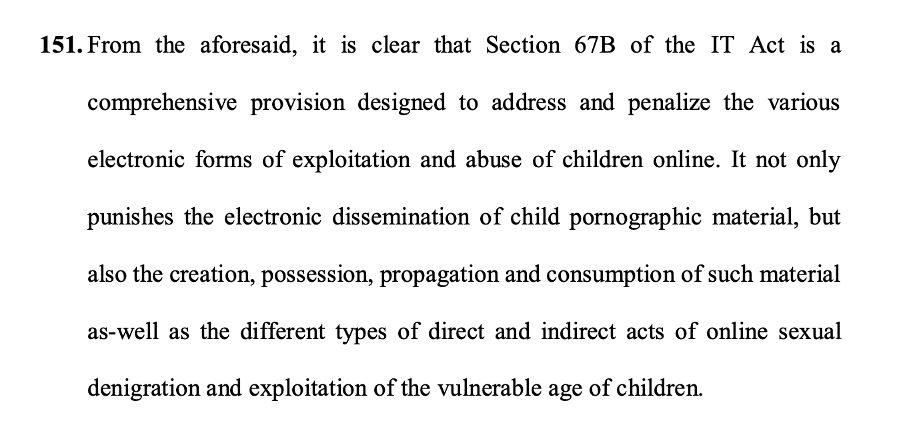
Moreover, the court emphasized that when an act is explicitly punishable under the law, the law takes precedence over principles of equity, and ignorance of the law cannot be used as a defence to absolve or lessen liability for such offences.
Consequently, the court set aside the judgment of the Madras High Court and recommended that the Union Government form an Expert Committee. This committee would be responsible for developing a comprehensive program or mechanism for health and sex education, as well as promoting awareness of the POCSO Act among children from an early age, to foster a robust and informed approach to child protection, education, and sexual well-being.
Supreme Court: Failure to furnish documents would deprive the detenu of right to effective representation and is violative of Article 22(5) of the Indian Constitution.
In Jaseela Shaji vs. The Union of India & Ors, the Supreme Court held that a detenu has the right to be provided with the grounds for their detention, along with any documents referred to or relied upon in the detention order and failure or even a delay in furnishing these documents would result in the denial of the detenu’s right to make an effective representation against their detention.
The three-judge bench comprising Justice B.R.Gavai, Justice P.K. Mishra and Justice K.V. Viswanathan was hearing an appeal against the Kerala High Court’s judgement which dismissed the habeas corpus petition for production of the detenu. The detention order, dated 31 August 2023, was issued by the Detaining Authority under Section 3(1) of the COFEPOSA Act, with the detenu taken into custody on 2 September 2023 based on 12 grounds.
The appellant’s counsel argued that the failure to provide the material upon which the Detaining Authority’s subjective satisfaction was based violates the detenu’s right under Article 22(5) of the Constitution of India, which ensures the right to make an effective representation against the detention. In contrast, the state’s counsel contended that it is not necessary to provide copies of every document that may be casually or incidentally mentioned in the facts, as long as they were not relied upon by the Detaining Authority when issuing the detention order. Having considered both submissions, the court considered two issues:
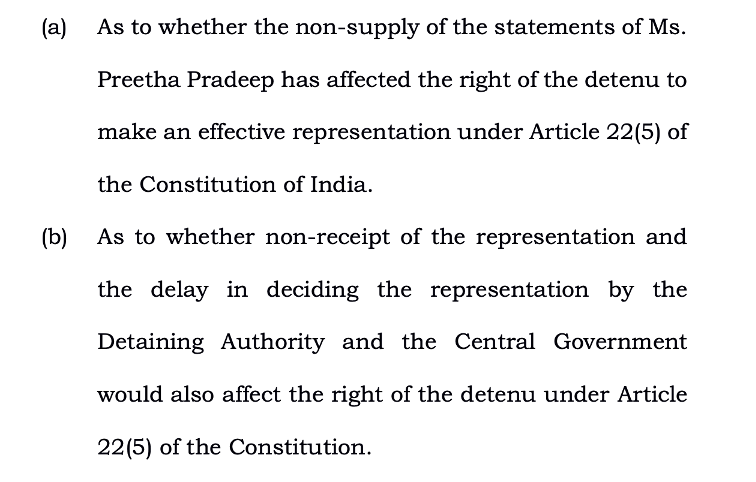
On the first issue, the court, relying on M. Ahamedkutty vs. Union of India and another, held that The constitutional requirements under Article 22(5) of the Constitution of India are twofold: (a)The Detaining Authority must, as soon as practicable after the detention, communicate to the detenu the grounds on which the detention order was made and (b) The Detaining Authority must provide the detenu with the earliest opportunity to make a representation against the detention order.
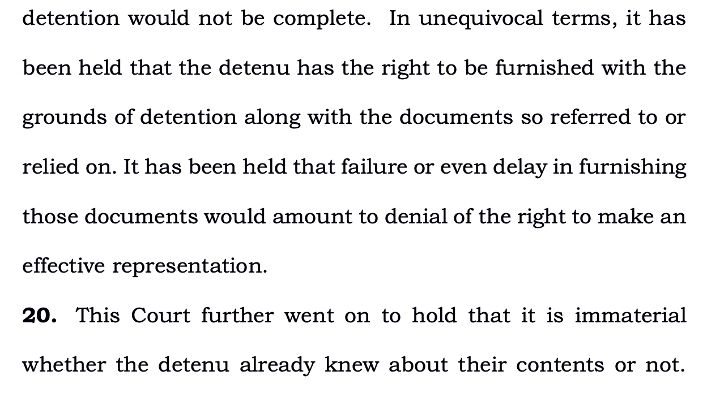
On the issue of non-receipt of representation and delay in deciding representation, the apex court held that it is the responsibility of the transmitting authorities to promptly forward the detenu’s representation, and the corresponding duty of the relevant authorities to swiftly consider and decide on it. However, in the present case, this procedure has been followed in breach, resulting in a failure to uphold these duties.
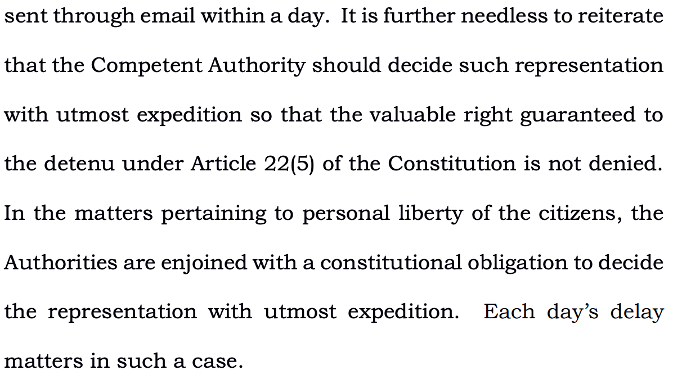
Accordingly, the Kerala High Court’s judgement is quashed and set aside, and the detenu is directed to be released forthwith, if not required in any other case.
Supreme Court: A candidate who has been duly elected through a democratic process cannot be prevented from assuming the elected office.
The Apex Court, in an interim order, in Sandeep Kumar vs. Vinod and Ors. held that a candidate elected through a democratic process cannot be stopped from assuming the elected office, particularly in the manner in which it has been done.
The brief facts of the case are as follows: The State Election Commissioner, Haryana (Respondent no.4), had issued a notification for the Panchayat elections on 07 October 2022. The deadline for filing nominations was 19 October 2022, with scrutiny on 20 October 2022, and polling scheduled for 02 November 2022. Of the four candidates who filed nominations, two, including respondent no.1, had their papers rejected on the grounds that they had not completed matriculation from recognized institutions. As a result, only two candidates remained. One candidate, Om Parkash, withdrew, leaving the appellant as the sole remaining candidate, who was then declared elected by the Returning Officer.
Despite being declared elected, the appellant has not been allowed to assume the office of Sarpanch, as respondent no.1 had filed the writ petition before the Punjab and Haryana High Court, resulting in the contested order. The appellant, who was not originally a party in the writ petition, filed his own writ petition upon learning of the proceedings, seeking a directive from the High Court to the Election Officer to give him charge as Sarpanch.
Citing the precedent set by the Supreme Court in Mohinder Singh Gill & Anr. vs. The Chief Election Commissioner, New Delhi & Ors., the appellant argued that as per the Haryana Panchayati Raj Election Rules, 1994 once elections are announced, they should not be interfered with, and after the election, the only remedy available is to file an election petition. The rejection of a nomination paper is a valid ground in such a petition, yet respondent no.1 did not pursue this legal remedy and failed to include the appellant as a party in his writ petition.
Given these circumstances, the court opined that an interim order is warranted, as a candidate who has been duly elected through a democratic process should not be prevented from assuming the elected office, especially in the manner it has occurred in this case. Accordingly, the Deputy Commissioner, Jhajjar, District Jhajjar-cum-District Election Officer is directed to give the charge of Sarpanch to the appellant.
Kerala HC: Right to get safe food is a part of the fundamental right guaranteed under Article 21 of the Constitution, need to address lacunae in Food Safety & Standards Act.
In Pepsico India Holdings Pvt. Ltd vs. State of Kerala, the Kerala High Court held that the Right to get unadulterated food is part of the fundamental right of every citizen, and a person who sells adulterated food should face the consequences and such persons should not escape from the clutches of law on technical grounds.
The brief facts of the case are as follows: the case stems from the prosecution initiated under the Food Safety and Standards Act, 2006 (FSS Act). The prosecution was based on an inspection conducted by the Food Safety Officer (FSO), who found the product “Mint & Lemon Flavoured Green Ice Tea,” manufactured by PepsiCo, to be unsafe and misbranded.
On 22 June 2015, the Food Safety Officer inspected the premises of Day Mart Hyper Market in Kannur, Kerala, and collected samples of the said product for analysis. The test results showed that the sample contained sodium saccharin and caffeine, both of which were not declared on the label, violating the Food Safety and Standards (Packaging and Labelling) Regulations, 2011. The State initiated a prosecution based on the Food Analyst’s report and the referral laboratory’s confirmation of the misbranding and adulteration.
The counsel for the petitioner challenged the prosecution, arguing that the divergent findings between the Food Analyst and the Referral Laboratory made the case against them unsustainable. According to the petitioner, while the Food Analyst reported that the product contained sodium saccharin, the Referral Laboratory’s report highlighted the presence of caffeine, which was not declared on the product’s label. The counsel for the state argued that the prosecution was valid based on the findings of the Referral Laboratory, which confirmed that the product was unsafe and misbranded as per the FSS Act.
The court looked at the Food Safety and Standards Rules, 2011 and the Prevention of Food Adulteration Act,1954, and found lacunae between both acts. Section 3.1.1 of the FSS Rules states that if the referral laboratory has, pursuant to the reference made by the Designated Officer in terms of sub-section (4) of section 46 of the Act confirmed the findings of the Food Analyst in his report, the Designated Officer shall examine the case on the basis of the sections under which the person has been charged as to whether the contravention is punishable with imprisonment or the same is punishable with fine only under the Act.

In Section (3) of the Prevention of Food Adulteration Act, it is given that the certificate issued by the Director of the Central Food Laboratory shall supersede the report given by the public analyst

In this case, there were divergent findings and section 2.4.6 of the FSS Rules, uses the word ‘final’ and not ‘supersede’ as was the case in the Prevention of Food Adulteration act.

The court found that there was a lacuna in the FSS act and Rules and due to this, it was forced to quash the proceedings against the petitioner. It relied on Tata Chemicals Limited vs. State of Maharashtra, 2024where a similar issue regarding divergent findings between food safety reports was addressed. The Bombay High Court had quashed the prosecution in that case due to the lack of consistent findings.
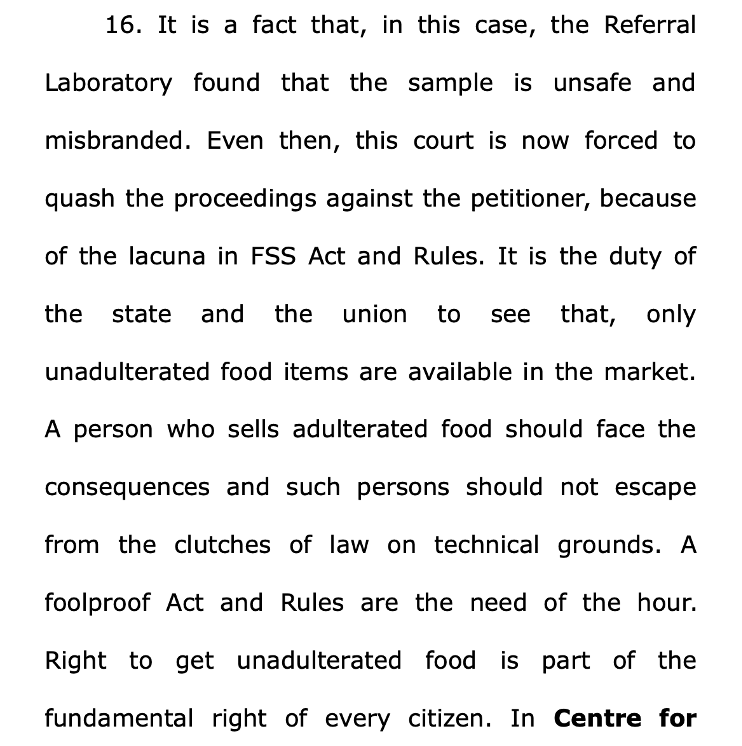
Accordingly, the proceedings against the petitioner were quashed and the court urged the Central Government to address this lacuna as it could seriously pose an infringement to the right to safe food.
Allahabad HC: Desertion cannot be established solely on the grounds that the parties are living apart due to their jobs
In Arvind Singh Sengar vs. Smt. Prabha Singh, the Allahabad High Court held that merely because the parties remained separated, desertion cannot be established on the strength of such vocational/employment compulsion faced by the parties.
The brief facts of the case are as follows: the current petition is an appeal filed by the appellant, Arvind Singh Sengar, under Section 19 of the Family Court Act, 1984. The appeal challenged the decision of the Principal Judge, Family Court, Kanpur Nagar, which dismissed the divorce petition filed by the appellant. The appellant had sought a divorce on the grounds of desertion and cruelty. The marriage between the parties was solemnized on 12 May 1999, and they had a child born on 20 June 2000. The couple had been living separately since 29 June 2003, due to their respective jobs—one in Jhansi and the other in Auraiya.
The Counsel for the appellant alleged that the respondent, Prabha Singh, had deserted him in September 2003, and claimed that they had been living separately for over a year and that this constituted desertion. The Counsel further accused the respondent of cruelty, citing a criminal case filed against the appellant under Section 498A, 323, 109 IPC for dowry demands. Another case was filed in 2006 under Sections 452, 323, 504, 506, and 324 IPC for other alleged offences. It is also argued that despite being posted close to the appellant’s ancestral home, the respondent had not made any effort to transfer to Jhansi, where he worked, further evidencing desertion.
The Counsel for the respondent denied the allegations of desertion. She presented medical evidence showing that on 29 June 2003, she had been hospitalized at Awadh Hospital, where the appellant visited her. This was used to refute the claim of separation from that date. The respondent argued that their separate living arrangements were due to their jobs—she worked as a primary school teacher in Auraiya, just 2 km from the appellant’s ancestral home, and the separation was not wilful desertion. She also presented evidence that the appellant had attempted to remarry during the subsistence of their marriage and that dowry demands were made to her family.
Upon looking at submissions from both parties, the court found that the desertion claim by the appellant lacked credibility. The court noted that the separate living arrangements were a result of vocational obligations, not desertion.
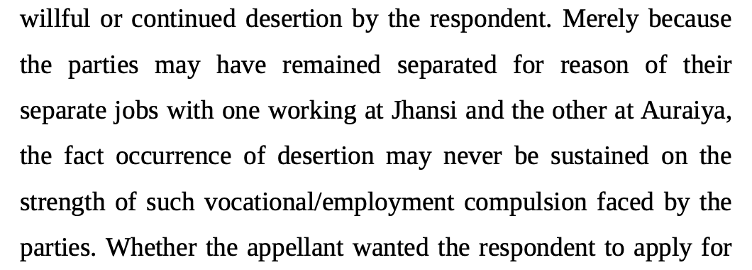
Regarding the grounds of cruelty, the court observed that the appellant failed to provide convincing evidence that the criminal cases filed by the respondent were false. Furthermore, the respondent provided credible evidence that the appellant had attempted to remarry and had made dowry demands, which substantiated her claims of cruelty.
Accordingly, the court upheld the findings of the Family Court, Kanpur Nagar, and dismissed the appeal.



